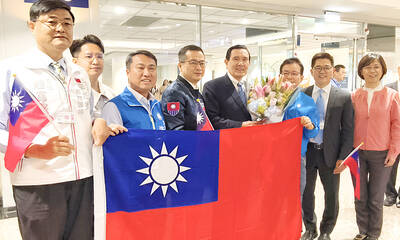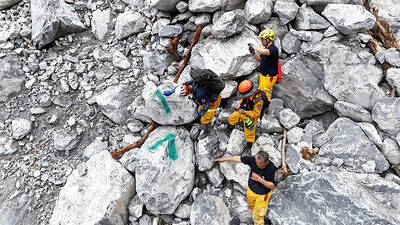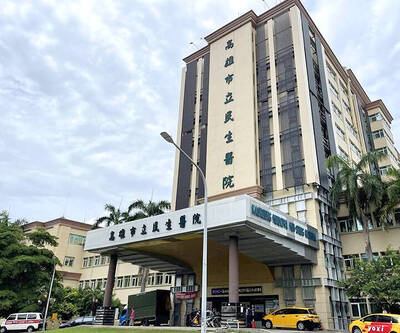The Criminal Investigation Bureau has admitted that it handed out 54 malware-infested thumb drives to the public at a data security expo hosted by the Presidential Office from Dec. 11 to Dec. 15 last year.
The malware-infected USB sticks were among 250 drives that the bureau gave to the winners of a game about cybersecurity knowledge.
The malware program with the file name XtbSeDuA.exe was designed to collect personal data and transmit it to a Poland-based IP address that then bounces the information to unidentified servers, the bureau said, adding that it was known to have been used by an electronic fraud ring uncovered by Europol in 2015.
Only older, 32-bit computers are susceptible to the malware and common anti-virus software can successfully detect and quarantine it, the bureau said.
The 8-gigabyte thumb drives were purchased from contractors and some of them were made in China, but the bureau has ruled out Chinese espionage, it said, adding that the infection originated from an infected work station at New Taipei City-based contractor Shawo Hwa Industries Co (少華企業).
An employee at the company used the affected computer to transfer an operating system to the drives and test their storage capacity, transmitting the malware to 54 units, the bureau said.
Random sampling of the thumb drives, which were sourced from various contractors, failed to discover the malware, it added.
Distribution was halted in the afternoon of Dec. 12, after members of the public complained that drives had been flagged by their anti-virus programs, it said, adding that 20 drives have been recovered while 34 “remain in the wild.”
The server receiving the data from the malware was shut down after the bureau took measures to address the issue, it said.
National Police Agency Director-General Chen Chia-chin (陳家欽) and National Security Council cybersecurity adviser Lee Der-tsai (李德財) were briefed on the incident, an anonymous source said.
National security officials are unhappy that a Presidential Office event was compromised and concerned that the event might have been deliberately targeted by a hacker group, the source said, adding that they have demanded the bureau launch another probe.
The bureau has apologized to the Presidential Office and other government agencies that participated in the expo, the source said.

Former president Ma Ying-jeou’s (馬英九) mention of Taiwan’s official name during a meeting with Chinese President Xi Jinping (習近平) on Wednesday was likely a deliberate political play, academics said. “As I see it, it was intentional,” National Chengchi University Graduate Institute of East Asian Studies professor Wang Hsin-hsien (王信賢) said of Ma’s initial use of the “Republic of China” (ROC) to refer to the wider concept of “the Chinese nation.” Ma quickly corrected himself, and his office later described his use of the two similar-sounding yet politically distinct terms as “purely a gaffe.” Given Ma was reading from a script, the supposed slipup

Former Czech Republic-based Taiwanese researcher Cheng Yu-chin (鄭宇欽) has been sentenced to seven years in prison on espionage-related charges, China’s Ministry of State Security announced yesterday. China said Cheng was a spy for Taiwan who “masqueraded as a professor” and that he was previously an assistant to former Cabinet secretary-general Cho Jung-tai (卓榮泰). President-elect William Lai (賴清德) on Wednesday last week announced Cho would be his premier when Lai is inaugurated next month. Today is China’s “National Security Education Day.” The Chinese ministry yesterday released a video online showing arrests over the past 10 years of people alleged to be

The bodies of two individuals were recovered and three additional bodies were discovered on the Shakadang Trail (砂卡礑) in Taroko National Park, eight days after the devastating earthquake in Hualien County, search-and-rescue personnel said. The rescuers reported that they retrieved the bodies of a man and a girl, suspected to be the father and daughter from the Yu (游) family, 500m from the entrance of the trail on Wednesday. The rescue team added that despite the discovery of the two bodies on Friday last week, they had been unable to retrieve them until Wednesday due to the heavy equipment needed to lift

MIX-UP: Kaohsiung Municipal Min-Sheng Hospital director Yen Chia-chi was suspended from his duties after surgeons operated on the wrong patient last week The Kaohsiung Department of Health yesterday fined Kaohsiung Municipal Min-Sheng Hospital NT$500,0000 for misidentifying two patients and consequently causing one of them to undergo the wrong surgery last week. The hospital’s director Yen Chia-chi (顏家祺) was suspended from his duties. The surgeon who was scheduled to operate on the patient was given a major demerit and is subject to subsequent disciplinary actions. Demerits were given to the anesthesiologist, the nurse in the operation room, the nurse in the ward and the worker who helped transfer the patient from the ward to the operation room for having failed to verify the patient’s identity. Meanwhile, the